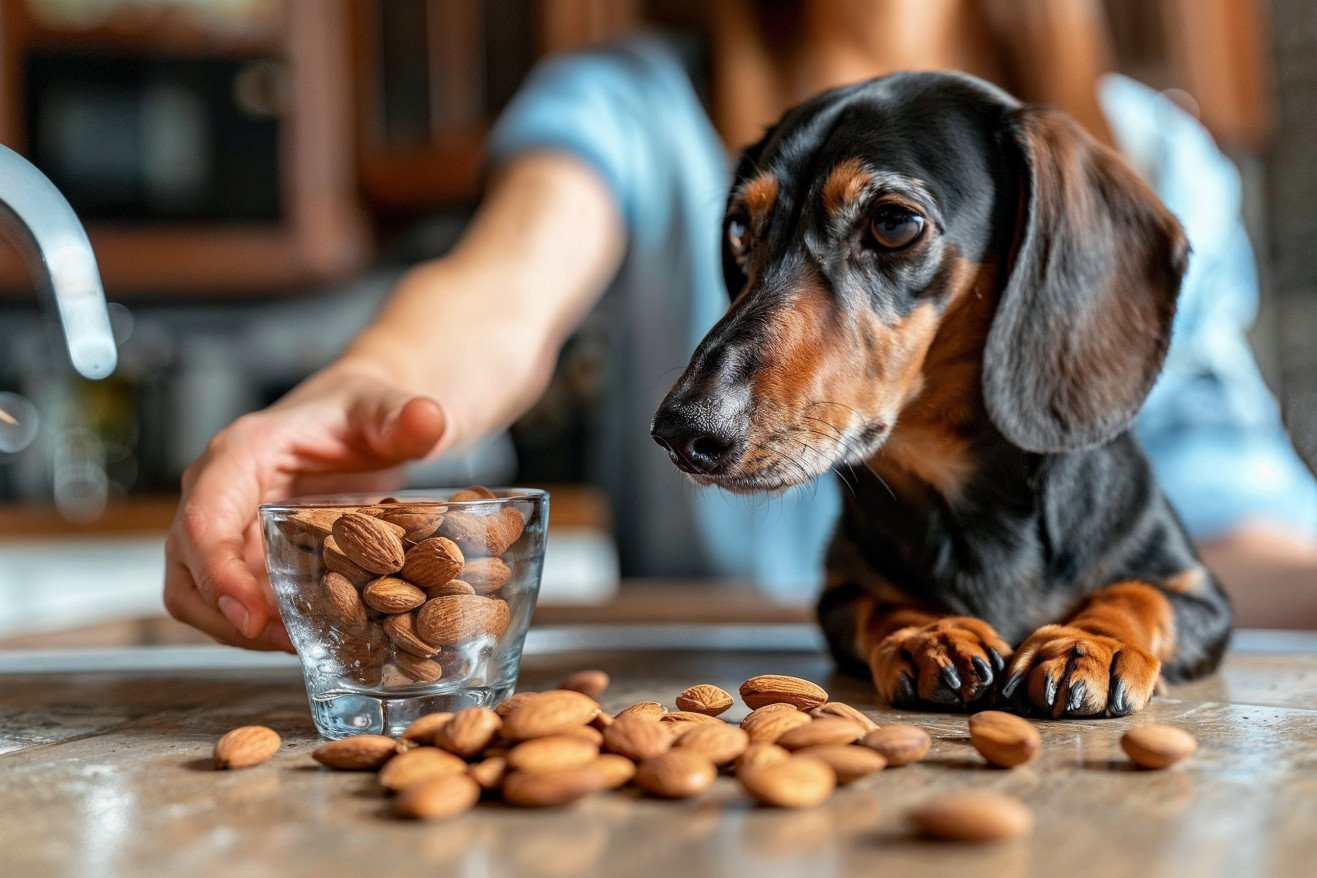Can Dogs Eat Almonds? Understanding the Risks for Your Pet
25 January 2024 • Updated 28 January 2024

Almonds are a popular human snack, but can you share them with your dog? No, dogs cannot eat almonds and doing so can lead to gastrointestinal distress and pancreatitis. They are also a choking hazard and can be hard for dogs to digest, so it’s best to avoid giving them to your pet.
Using veterinary and canine nutrition studies, we will look at the issues that can arise when dogs eat almonds. We will also look at the physiology of a dog’s digestive system and the potential toxic effects of foods that are safe for humans but not for dogs. By the end of this article, you will understand the dietary risks of feeding your dog almonds and know some safe, healthy treats to give them instead.
Can dogs eat almonds?
Risks of Feeding Almonds to Dogs
While almonds are not poisonous to dogs, there are several risks associated with feeding them to your pet. Most commonly, dogs will suffer from gastrointestinal upset, including vomiting, diarrhea, and general discomfort after eating almonds, according to PetMD. The high fat content in almonds can also lead to pancreatitis, a painful and potentially life-threatening condition in dogs that can cause symptoms like loss of appetite and lethargy, which will require medical treatment.
In addition to the health risks, there are also physical risks associated with feeding almonds to dogs. Because of their size and hardness, almonds can be a choking hazard, especially for small dogs. If a dog doesn’t chew an almond properly, it can become lodged in their throat or intestines, which can lead to life-threatening complications that may require surgery, according to the American Kennel Club.
Finally, almonds are not nutritionally beneficial for dogs and may contain harmful additives or Aspergillus mold, which can be toxic to dogs. Given these risks, it’s clear that almonds have no place in a dog’s diet. Instead, it’s important to feed dogs food that’s been formulated to meet their nutritional needs to ensure their health and well-being.
Decoding the Dietary Divide: Why Almonds Aren’t Good for Dogs
While people can eat a wide range of foods, including nuts like almonds, dogs have specific nutritional requirements that need to be met in order to stay healthy. The Association of American Feed Control Officials (AAFCO) notes that a complete and balanced diet for dogs includes proteins, fats, carbohydrates, minerals, and vitamins.
Dogs also need certain essential amino acids and fatty acids that people don’t need in order to be healthy, according to VCA Animal Hospitals.
Almonds, which are high in fat, are not good for dogs. Their bodies can’t process high levels of fat as well as people’s can, which can lead to health problems like pancreatitis. In addition, dogs may have trouble digesting nuts and may be allergic to the allergens in them, according to PetMD.
Finally, dogs don’t need nuts to get the health benefits that people can get from eating them, and the additives and contaminants in nuts can be toxic to dogs.
It’s important to note the importance of a diet that’s formulated specifically for dogs. Dr. Deborah E. Linder from Tufts University’s Clinical Nutrition Service notes that foods that meet AAFCO standards make sure that all essential nutrients are provided in the right amounts. By focusing on dog-specific dietary formulations, we can avoid the nutritional deficiencies and health problems that foods like almonds can cause in our furry friends.
The Canine Digestive Response to Nuts
In order to understand the canine digestive response to nuts, it is important to look at the basic physiological differences between dogs and humans. Dogs have a much simpler digestive system, as explained by Whole Dog Journal, and are not as well-equipped to digest complex foods like nuts.
The pancreas is responsible for the production of digestive enzymes that help to break down proteins, fats, and carbohydrates. However, the high fat content in nuts, including almonds, can be too much for the pancreas to handle, leading to digestive upset.
Pancreatitis, or inflammation of the pancreas, is a significant risk when dogs eat fatty foods like almonds, according to Happy Dog UK, and can lead to pain and other health problems in dogs. In addition, the physical shape and size of nuts can cause blockages in a dog’s digestive system. These blockages can be a choking hazard and can also lead to serious gastrointestinal issues.
Given these risks of including nuts in a dog’s diet, it is important to look at other options. There are treats that are safe and appropriate for dogs that are made with their digestive systems in mind and that can provide the same nutritional benefits without the risks.
Healthy Snacks for Your Dog
If you want to give your dog a snack, it’s important to make sure that you’re giving them something that’s safe for them and that meets their dietary needs.
For example, Purina notes that peanuts (not in the shell) and peanut butter without xylitol can be good options because they’re high in protein and contain biotin and vitamin E.
However, they’re also high in fat and calories, so they should be given in moderation. Similarly, Pawlicy Advisor says that cashews can be a good option if they’re unsalted, unprocessed, and given in moderation.
Hazelnuts can be a good occasional treat if they’re unsalted and given in moderation, but they can be a choking hazard for smaller dogs.
Many dog treats are designed to help with things like dental health, joint health, or anxiety. These treats are made to be safe and healthy for dogs to eat.
However, it’s important to make sure that you’re giving your dog the right amount of treats for their size and activity level so that they don’t gain too much weight and develop health problems.
As Preventive Vet points out, it’s best to avoid human foods that are toxic to dogs and stick to treats that are made to meet dogs’ dietary needs. Regular check-ups with your vet can help you make sure that you’re giving your dog treats that are safe and healthy for them.
What to Do If a Dog Eats Almonds
If your dog has eaten almonds, it’s important to act fast. The Pet Poison Helpline says the first thing you should do is make sure your dog can’t eat any more almonds and take away any that are left.
Keep an eye out for symptoms of almond poisoning, which can include vomiting, diarrhea, lethargy, and abdominal pain, according to Rover.com. In more serious cases, dogs can experience muscle tremors and seizures, especially if the almonds are moldy or contain mycotoxins.
According to WagWalking, dogs will usually need to be treated by a vet if they have almond poisoning. Treatment may include IV fluids and supportive care medications, and if the dog has aflatoxin poisoning from moldy almonds, they may also need Vitamin K therapy and hepatoprotectants.
If you notice any signs of gastrointestinal upset or think your dog may have almond poisoning, take them to the vet right away. You can also call the Pet Poison Helpline for help and advice.
It’s important to act quickly and knowledgeably to help your pet. Make sure to work with the professionals to ensure the best possible outcome for your dog.
Final Thoughts on Almonds and Canine Health
To sum up, almonds are a risky food for dogs due to the potential for gastrointestinal upset, pancreatitis, and choking. These risks, combined with the lack of nutritional value for dogs and the potential for toxic additives or aflatoxin contamination, make it clear that almonds have no place in a dog’s diet.
This investigation has only served to further emphasize the importance of feeding dogs a diet that is specifically designed to meet their nutritional needs and support their overall health.
It’s up to us as pet parents to choose treats that are safe, healthy, and suitable for our dogs. As we’ve covered, there are plenty of dog-friendly options that don’t come with the risks associated with human foods like almonds.
Talk to your vet about personalized nutrition recommendations and any concerns you may have about your dog’s health, especially if you suspect your dog has ingested almonds or another potentially toxic food. They can help ensure that your dog’s diet is set up to help them live a long, healthy life.


